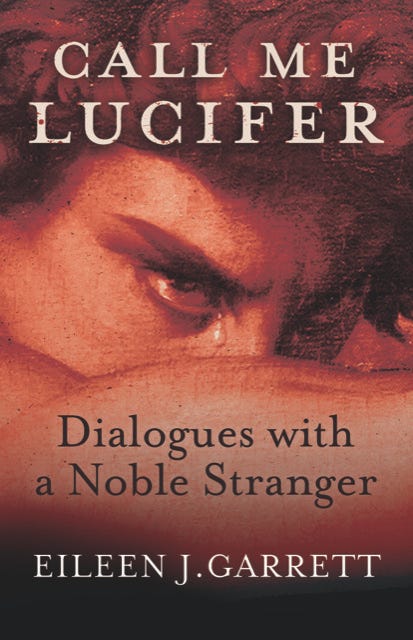I was completely intrigued when a professor at Rhine Education Center spoke on Eileen J. Garrett. My fascination increased twofold when I heard of a book that she wrote but did not publish, one that contained a rare dialogue between the author and the Noble Stranger, Lucifer.
The name “Lucifer” has probably caused much reaction, enough to arrest any further scholarly pursuit of Garrett’s text. Such a name carries strong historical associations, much of it planted by religion with political backing to force cultural cooperation of its theological explanation. For this reason, any student of the esoteric finds etymology paramount to prevent biases that often go unchecked. As Garrett wrote, “Sin is anything that transgresses the code of theological honor held by man”. This holds true of the reader familiar with the scrutinized medium and author.
Outside of theologies that cast a grim, dark entity, esoteric philosophy concurs with Garrett’s depiction of Lucifer as a source of wisdom. That Garrett portrays the Noble Stranger as a basis for knowledge in the face of strong religious objection may explain why she kept her book quiet. As Garrett put it, “I realize men conceive of him as evil.” But let’s not confuse an understandable hush in the face of a culture that minimized the role of women and religious dogma that ensured keeping them ‘in their place’ from Eileen’s confident and daring personality seeping into the text.
Curiously, the Lucifer in the book contains consistency with ancient esoteric portrayals. This could suggest that Garrett had knowledge of esoteric philosophy. This is assuming, however, that the relationship she describes is solely the work of the mind. Religious lingos and themes in keeping with a long but secret tradition could propose a genuine intimacy with “Other”.
I offer a suggestion to the reader who comes in contact with Call Me Lucifer. Remember that ignoring the influence of preconceived ideas, religious or otherwise, are not in keeping with fair investigative processing. If the name “Lucifer” proves jolting as you encounter this book, chances are that personal analysis is in order. But isn’t that the path of the novice and seasoned parapsychologist?
— Kevin Quiles, M.Div., M.A. author of Bring Your Pen, Bring Your Broom.






